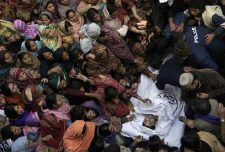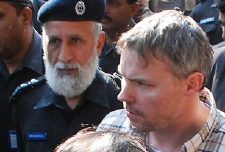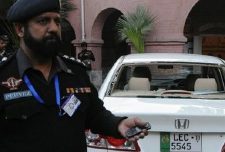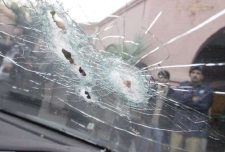Adil Najam
UPDATE POST HERE: March 16, 2011: Raymond Davis Released! This Story Ain’t Over Yet!
Strangely, the more we get to know about the case of Raymond Davis, the less we seem to know. Even more strangely, the fact that the entire incident happened in broad daylight and in front of dozens of witnesses seems is itself confusing the facts rather than adding clarity. Moreover, it seems that no one seems to want to get much clarity either; although different parties may want different parts of the story to ‘disappear.’ The incident was rather eerie and disturbing to begin with; and it continues to become more so.




Here is what one does know. Raymond Davis, a staff member of the US Consulate in Lahore shot two Pakistani men dead on Thursday in a crowded part of Lahore (Mozang Chowk), according to him in self-defense. A US Consulate vehicle that rushed in to ‘rescue’ Mr. David then ran over a third person, who also died. A murder case was then registered against Raymond Davis, who was handed into police custody. A case has also been registered against the driver of the US Consulate vehicle that ran over a third person, but the driver has not yet been apprehended. After a fair deal of scrambling by both US and Pakistani officials on what to do or say, the positions of both have now started becoming clear and they have taken the stance that is usually taken in such cases: the US is asking that Raymond Davis, as a diplomatic functionary, should be handed back to them; Pakistan seems to be responding that the matter is sub judice and should take its course.
Beyond that, there are more questions than answers. For most part, these questions fall into three categories: (1) Questions about who is Raymond Davis? (2) Questions about exactly what happened at Mozang, Lahore? (3) Questions about what should happen now ?
On the first question, earliest reports suggested that Raymond Davis was a “technical adviser” and a “consular” official. More recently, US Embassy officials have described him as a “functionary” of the Embassy assigned to the US Consulate in Lahore and carrying a US Diplomatic passport. Reportedly he was hired at the US Consulate in Lahore as a security contractor from a Florida-based firm Hyperion Protective Consultants. All of this has material relevance to whether he would enjoy diplomatic immunity or not, but even more because of the apprehensions of many Pakistanis that he could be linked to the CIA or to the infamous firm Blackwater (later renamed XE Services).
And that leads squarely to the second question: what exactly was happening at Mozang? Very much in line with the immediate knee-jerk reaction of many Pakistanis, an early commentary by Jeff Stein in The Washington Post seemed to suggest rather fancifully that the shootout could have been a “Spy rendezvous gone bad?” That would be a conspiracy theory, but not an entirely implausible one. Mozang is not a part of town that you would expect too many foreigners, let alone a US official, visiting; and certainly not in what was reportedly a rented private vehicle. And while Pakistan today is clearly an unsafe place, the question of just why an Embassy official was carrying a firearm be wished away. On the other hand, however, Mr. Davis claims that he shot in self defense as the two men on the motorcycle were trying to rob him at gun point. Anyone who knows Pakistan knows all too well that this, too, is entirely possible. TV footage and reports coming immediately after the incident showed one of the young men lying dead with a revolver and wearing an ammunition belt. And certainly, the question of why at least one of the two young men on the motorcycle was carrying a loaded firearm cannot be wished away just because he had “dushmani.” Indeed, serious questions need to be asked about just who the two young men on the motorcycle were, just as they need to be asked about who Raymond Davis is. There just seem to be too many unnecessary weapons in too much proximity in this story. All of the many explanations that are floating around are very disturbing, but also very plausible. Which is exactly why this story is even more dangerous if left unresolved.
Finally, the third question – which is now getting the most attention – about what should happen now. Much is being made – maybe too much – about the Vienna Convention and its implications for diplomatic immunity. Familiar diplomatic games about the minutia of vocabulary are being played and will in most likelihood result in all too familiar results. That is exactly what one would expect in any such situation anywhere. But this is not ‘any‘ situation’; and this is not ‘anywhere‘. This is about US-Pakistan relations: there is just about nothing that the US can say or do which Pakistanis are likely to believe, and there is just about nothing that Pakistan can say or do which Americans are likely to trust. Which is why getting stuck in the intricacies of the Vienna Convention of 1963 is the exact wrong place to get stuck. This is a time for public diplomacy: certainly from the US and maybe even from Pakistan. It is not in America’s interest to be seen to be standing in the way of justice and due process. And it is not in Pakistan’s interest to be seen to conducting a flawed process of justice. There are too many people on the extreme in both countries who will not and cannot to change their opinion and apprehensions about the other. But there are even more people in both countries who could all too easily be swayed to the extremes on distrust if this delicate case is not handled with clarity and transparency by both countries. Doing so will probably bring with it more than just a little diplomatic embarrassment. Not doing so can only bring worse in the tinderbox that is US-Pakistan relations.




















































Word from Washington.
The force behind the removal of Foreign Minister Makhdoom Qureshi is none other than our own US Ambasssador Hussain Haqqani. When not flirting of twitter with poetry, he has been working overtime in undermining Qureshi both to the US and in Pakistan to Zardari and planting stories in both places about how unreliable a partner Qureshi is.
What does this part of town offer a staffer/security expert. Was it an intelligence operation gone bad, or interrupted by a robbery. Was it on operation? If they were targeted, why in broad daylight on a crowded street? Why were they armed, and how did Davis know they would be? Just spitballing. If your rational and wish to discuss. djlp@aol.com
Amazing story from the editor of The News, Islamabad. Rings true to me:
It’s not a rumour, Americans did get Qureshi’s scalp
By: Mohammad Malick
The News
12 February 2010
When powerful men meet to discuss explosive issues, things can change in a big way. And that is precisely what happened after a highly secretive and immensely important meeting at the Presidency a few days back. The subject, not unexpectedly, being the fate of American killer Raymond Davis and that of Pakistan-US relations. Little did anyone know at the time that the huddle would instead end up deciding the fate of Foreign Minister Shah Mehmood Qureshi.
The meeting, convened by the president was attended by Prime Minister Gilani, Babar Awan, Rehman Malik, Shah Mehmood Qureshi and the DG ISI Gen Shuja Pasha. The president was given an exhaustive overview of the entire situation but quite early in the meeting it became evident that two of the men were standing on the wrong side of the prevalent dominant wisdom and desire of somehow finding a way to retrospectively cough up diplomatic immunity for Davis and to just wish away all the four deaths and the lingering crisis. But since one of the ‘erring’ two dared not be arbitrarily fired, poor Qureshi’s fate stood sealed.
Extreme pressure was exerted in the meeting on the former foreign minister to renege from his earlier stance and simply tell the court that the Foreign Office was in consonance with the American interpretation of Davis being a genuine diplomat and enjoying full immunity under Vienna Convention 1961. Facts be damned. According to highly reliable sources, interior ministry’s immense resources were also offered to cause any necessary change of documentation or any exceptional service warranted under these exceptional circumstances.
An adamant Qureshi, who had strongly argued the case that Raymond did not enjoy unlimited diplomatic immunity under law, flatly refused and even said that if need be, he’d rather resign than become an accessory to multiple murder. The meeting ended on a rather unsavoury and unexpected note. It was a surprising outcome for all the others because Qureshi had always been perceived, and even pilloried by the media, as being an American lackey and was not expected to dig in his heels over an issue so vital for the US administration.
But Qureshi’s latest run in with the Americans did not begin or end inside the Presidency. It had actually begun much earlier on January 28, a day after the deadly Raymond Davis incident in Lahore. He was in Karachi when he first received a call from US Ambassador to Pakistan, Cameron Munter and then had a conversation with US Secretary of State, Hillary Clinton. Munter requested him for immediate councillor access to Davis and his immediate handover to US Consulate authorities. Qureshi asked Foreign Secretary Salman Bashir to talk to Munter and while authorising immediate councillor access to Davis made it clear to the foreign secretary that the matter of release would only be decided by the court as the legal process had already been kicked into motion in Punjab. Then came Hillary’s call.
An understandably perturbed Hillary wanted the immediate handover of Davis and insisted that Pakistan was violating the Vienna Convention by the illegal incarceration of a “US diplomat”. Confirming the contents of that conversation to The News, Shah Mehmood said that he had patiently explained to Hillary that while he understood her anxiety she too had to understand the highly emotive and sensitive nature of the incident. And also that since the judicial process had been kick-started in Lahore, the Foreign Office and the US had little option but to submit to the due process of law. Anyway, the two decided to discuss the matter on the sidelines of the then forthcoming Munich Security Conference, and the line went silent.
Since then, Ambassador Munter and other senior embassy officials remained busy with engaging Pakistani authorities and the Foreign Office, blowing hot or cold, depending upon the level of their own frustration and the pressure coming their way from Washington. A few days prior to the Munich Conference, Qureshi received a call from Ambassador Munter who said that he had been directed to convey the message that unless Qureshi signed the diplomatic immunity paper prior to the conference, the scheduled meeting between him and Hillary would stand cancelled. The message was starkly clear a la George Bush: You are either with us or against us. So be it, Qureshi is reported to have told the ambassador and even cancelled his trip altogether. The chief of the army staff went instead to Munich and that is an appointment that even the US secretary of state cannot cancel, Davis or no Davis.
Once Qureshi ignored the latest Hillary communique, the Americans stopped talking to him altogether because it had now become evident that Qureshi was not going to budge on his stance of Davis not being eligible for full diplomatic immunity. Qureshi was no longer a welcome dinner guest and neither could he be allowed to remain in office. The last thing Washington can afford is his having a Pakistani foreign minister with a reawakened conscience.
According to highly reliable sources, the next claimed scalp may be that of the equally intransigent (from American perspective), Foreign Secretary Salman Bashir who is now the only remaining top level hurdle in the apprehended shameless handover of Davis by a compromised political leadership. The foreign secretary is also of the considered firm view that Davis does not qualify for full immunity. And there are legitimate causes for this argument, which were further exposed by glaring inconsistencies in the forever changing US stance on the issue.
Owing to the paucity of space, irrefutable arguments proving Davis’ ineligibility are not being reproduced here and also because a lot has already been written on the legal aspects of the subject, including the highlighted fact that in the initial reaction by US authorities, Raymond Davis was identified as merely an “employee” of the US Consulate in Lahore, but never as a diplomat. He was referred to as an employee and not a consulate general official. “It was a simple clerical error” was the incredulous justification offered by two senior members of the Islamabad embassy in an off-the-record conversation with the scribe. But it gets even better.
A lot is being made by the Americans and their interlocutors of the January 20, 2010 communication of the Islamabad embassy wherein the FO had been asked for the issuance of a non-diplomatic identity card for Davis. It is being argued that this communication clearly identifies Raymond Davis as being administrative and technical staff of Islamabad embassy and therefore automatically eligible for diplomatic immunity. But this is only half the story.
Certain discrepancies in 2010 had already caused the Foreign Office to seek clarifications. In Sept 2009, the US State Department had originally identified him as technical advisor (contractor) going on “official business” while applying for his visa. Later he was attached to US Consulate Lahore as an employee. So when his name popped up again in January 2010, identifying him as being attached with the US Embassy Islamabad, the FO wanted answers to some very pertinent questions. The relevant FO officials repeatedly asked the US embassy to provide the details of Davis’ new responsibilities along with those of his past postings. When weeks had passed with the embassy avoiding a categorical clarification on this count, the FO finally sent a formal Note Verbale to the US embassy on July 8, 2010. It bore ref no: P(1-A)/2009-ID(USA). This note pertained to a total of ten Americans about whom similar details were being sought from the embassy but no response had been forthcoming from the US end. Davis was listed as Note No:252/HR. When FO authorities were asked about the presence of 2009 in the reference number of the note verbale otherwise sent on July 8, 2010, they clarified that it was perfectly in accordance with their internal filing sequence and did not reflect any anomaly.
Unable to cover this critical gap in their argument to secure Davis’ release on the afterthought alibi of diplomatic immunity, the US embassy has adopted the rather incredulous argument of denying outright the existence of this critical correspondence. The FO has been told at the highest level that the US embassy never received this Note Verbale. The two senior functionaries stuck to the denial mantra when asked by The News about the embassy’s refusal to divulge the real assignments and other details of Davis and nine others. They insisted that all the embassy records had been thoroughly checked but there was no evidence of the cited note verbale ever being received. When they were told that the July 8 note was present in FO records and its existence and its having been sent to US embassy was recorded in more than one place and constituted a process that could not be tampered with within hours of an event taking place, the duo took the reference number of the ‘missing note’ to ostensibly try locating it from their records. This raises an interesting question: if they still needed the reference number at this stage, then how did they even check their records earlier?
Can you name a single other incidence where prior to this particular note verbale or since, any note verbale sent by FO to the US embassy has ever gone missing? the two functionaries were asked. Not surprisingly, the duo could not cite a single such incidence.
Interesting coincidence one must say, where the entire US administration makes critical clerical errors which only expose Davis as being a non-diplomat. Another interesting coincidence again, when only one specific official communication out of hundreds of similar exchanges goes missing, and which once again stood to expose Raymond Davis for being anything but a legitimate diplomat on a legitimate diplomatic assignment.
NOTE:This is a cross post from THE NEWS:
http://www.thenews.com.pk/TodaysPrintDetail.aspx?I D=3939&Cat=13&dt=2/12/2011
This is a lousy piece of analysis. The article itself trying to create a subversive case for handing over Davies to Pakistan.
The dead person on the motorcycle having a loaded weapon and an ammunition belt doesnt signify anything. How did Davies know that he was about to get shot from two persons, unless he knew the people in advance! One of them even did not carry a gun.
Any student of basic intelligence training and homeland security analysis would know that covers are not usually blown out in public until the implications of danger are far greater than the blown cover. Davies, like any trained person, had three options. One was to hide, which was not possible since he may have been marked. The other was to let the incoming threat kill him and the third was to overcome the threat while compromising his cover. He took the third option because his being dead would have posed more problems for US than his attackers being dead.
The question is, what would have happened if such action was carried out in the markets of New York by a Pakistani? What would the US do to that Pakistani?
What diplomatic immunity or US-Pakistan diplomatic relations would come into play? The author should look at how US has dealt Pakistanis in the past with much less graver concerns than this! There are no diplomatic relations between US and Pakistan except for you give, we take!
Wakeup Mr. Author!
Good analysis
But please note that in Pakistan guns are not a rare thing; especially as the family of the one of the two murdered Pakistanis has explained that the man carried the gun as he had enemies and a case was going on in court.
There is no evidence that any of the 2 men even took out their guns.
Carrying a licensed weapon is not a crime in Pakistan, and even if it were, is it a reason for a foreigner to give them death punishment?? So please my friends do not be chamchaas of America; you are not going to get a green card in reward